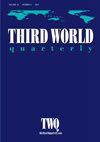Exploring inclusive victimhood narratives: the case of Bosnia-Herzegovina
IF 1.8
2区 经济学
Q2 DEVELOPMENT STUDIES
引用次数: 0
Abstract
Abstract Narratives are essential tools for communicating thoughts about competitive and inclusive victimhood socially and politically. In reconciliation processes, promoting narratives of inclusive victimhood (an understanding that ‘we all suffered together’) has been suggested as one way to overcome competitive victimhood (the idea that one ethnoreligious group or nation is the sole or primary victim in a conflict or war). However, the notion of inclusive victimhood remains understudied in post-war contexts in which exposure to violence was relatively imbalanced between former adversaries. This article traces the potential narrative variation from competitive to inclusive victimhood in post-war Bosnia-Herzegovina. It draws on (1) the competitive victimhood typology as an analytical tool and (2) a mapping of narrative sites as a methodological tool for tracing collective victimhood. The article scrutinises less competitive and inclusive accounts of victimhood identities in Bosnia-Herzegovina by examining the narratives that recognise outgroup victimhood and acknowledge ingroup responsibility for harmdoing. It suggests that there is potential for peaceful coexistence realised through the narrative of shared suffering, especially in post-war contexts where the exposure to violence was not entirely unidirectional. However, shared responsibility is less likely to be observed when the exposure to violence was highly asymmetrical.探索包容性的受害者叙事:波斯尼亚和黑塞哥维那案例
摘要叙述是在社会和政治上交流竞争性和包容性受害者思想的重要工具。在和解过程中,促进包容性受害者的叙述(理解“我们都在一起受苦”)被认为是克服竞争性受害者的一种方法(认为一个种族、宗教团体或国家是冲突或战争中唯一或主要的受害者)。然而,在战后的背景下,包容性受害者的概念仍然没有得到充分的研究,在这种背景下,前对手之间的暴力暴露相对不平衡。本文追溯了战后波斯尼亚-黑塞哥维那从竞争到包容的受害者身份的潜在叙事变化。它借鉴了(1)竞争性受害者类型作为分析工具,(2)叙事地点的映射作为追踪集体受害者的方法论工具。本文通过研究承认外部群体受害者身份和承认内部群体对伤害负有责任的叙述,仔细审查了波斯尼亚-黑塞哥维那受害者身份的不那么具有竞争性和包容性的描述。它表明,通过共同受苦的叙述实现和平共处的潜力,特别是在战后的背景下,暴力的暴露并不完全是单向的。然而,当暴力暴露高度不对称时,共同责任就不太可能被观察到。
本文章由计算机程序翻译,如有差异,请以英文原文为准。
求助全文
约1分钟内获得全文
求助全文
来源期刊

Third World Quarterly
DEVELOPMENT STUDIES-
CiteScore
4.10
自引率
15.00%
发文量
137
期刊介绍:
Third World Quarterly ( TWQ ) is the leading journal of scholarship and policy in the field of international studies. For almost four decades it has set the agenda of the global debate on development discourses. As the most influential academic journal covering the emerging worlds, TWQ is at the forefront of analysis and commentary on fundamental issues of global concern. TWQ examines all the issues that affect the many Third Worlds and is not averse to publishing provocative and exploratory articles, especially if they have the merit of opening up emerging areas of research that have not been given sufficient attention. TWQ is a peer-reviewed journal that looks beyond strict "development studies", providing an alternative and over-arching reflective analysis of micro-economic and grassroot efforts of development practitioners and planners. It furnishes expert insight into crucial issues before they impinge upon global media attention. TWQ acts as an almanac linking the academic terrains of the various contemporary area studies - African, Asian, Latin American and Middle Eastern - in an interdisciplinary manner with the publication of informative, innovative and investigative articles. Contributions are rigorously assessed by regional experts.
 求助内容:
求助内容: 应助结果提醒方式:
应助结果提醒方式:


